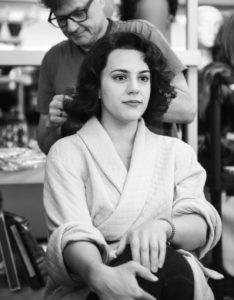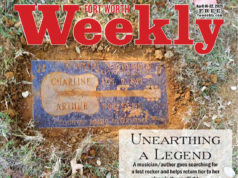
One recent afternoon, JFK director and set designer Thaddeus Strassberger was juggling several roles, adjusting furniture one moment, the next delving into existential questions that the libretto posed for the actors. Other uncertainties were decidedly straightforward.
“Should I grow a beard?,” asked tenor Sean Panikkar, inquiring about his role as secret service agent Henry Rathbone.
“No,” Strassberger quickly replied. “In the 1960s, the secret servicemen were clean shaven.”
Their large rehearsal space, part of the Fort Worth Museum of Science and History, was anchored in the center by a massive rotating stage. The platform, elevated four feet, was partitioned into four equally sized rooms: two bedrooms, a bathroom, and a living room.
Panikkar was standing in the bedroom next to mezzo-soprano Daniela Mack, who was rehearsing the part of young Jacqueline. He was directing his questions offstage, toward Strassberger, who was seated next to FWO pianist Emily Urbanek, Vavrek, and conductor Steven Osgood. During rehearsals, Osgood was a curious sight, conducting an imaginary orchestra, pointing to and cuing invisible musicians as Urbanek played.
Strassberger was directing the musicians not only through JFK’s many staging challenges but also through the complex conceptual ideas behind the opera.
JFK is a mix of historically informed storytelling intertwined with fictional flights into the inner thoughts and dreams of the former president and first lady. One of Jack’s dreams takes place on the moon. References to Greek mythology throughout the opera, often sung by an onstage chorus, only add to the otherworldly feel of the composition. The opera is set largely at the Hotel Texas in downtown Fort Worth and is divided in two halves: Night until Morning and Morning until Noon.
The results, according to Little and Vavrek, are intended to push the dramatic work beyond the late president’s assassination, love affairs, and celebrity status to address bigger ideas like mortality, inner struggle, loss, and love.
“We project onto the Kennedys our own fears of death,” Little said. “His assassination represented a cosmic page turning for the country. It was a different country after his death.”
******
The final form of the opera contrasts sharply from the ideas tossed around by FWO artistic director Nathan DePoint, general director Darren Woods, former managing director Keith Wolfe, and former stage director Kurt Howard in late 2011.
At the time, Woods recalled, the team agreed on two things: They wanted a new work, and the work should center on Fort Worth. JFK is FWO’s third commission. The first, Frau Margot, premiered in 2007. The second, A Wrinkle in Time, was slated to premiere during the 2015 festival but was cut and suspended indefinitely for budget reasons.
The deadline for JFK was set for 2016 for the company’s dual anniversaries.
The first ideas, Woods admitted, were borderline hokey and played to Fort Worth’s tired cowboy image. A story about Butch Cassidy and the Sundance Kid came up but did not jazz the FWO team.
“Didn’t President Kennedy spend his last night alive in Fort Worth?” Howard asked.
Woods, who was surprised that he didn’t know that historical tidbit, became fascinated with that idea. The team now had a worthy topic to explore, but there was one huge problem. The president and his wife’s Fort Worth visit was short, only one evening and the following morning.
Those problems, Woods said, would have to beaddressed by the composer and librettist. Initially, the general director wanted an established composer such as Mark Adamo (Little Women) or Jake Heggie (Dead Man Walking) for the commission. But over the course of the next year-and-a- half, he would change his mind.
******











